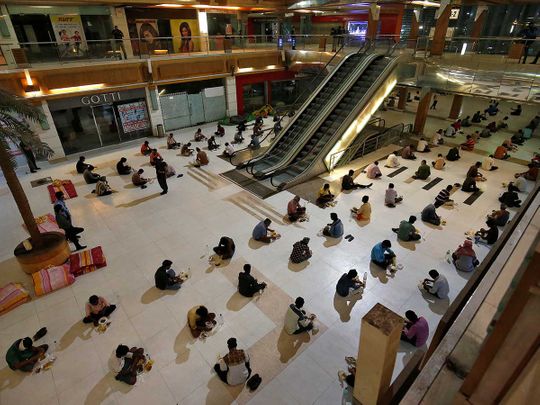
New Delhi: Several Indian states have abandoned key parts of their labor laws to allow companies to hire-and-fire staff at will or extend working hours as the country's economy reels from the impact of a six-week-long lockdown aimed at containing the spread of the coronavirus.
India’s economic growth is expected to see 0 per cent expansion in the current fiscal year, analysts at Moody’s have said.
The lockdown, which began on March 25, was relaxed in all but the worst affected areas on May 4 with factories and offices allowed to reopen while maintaining social distancing norms. The prolonged stay-at-home order has crippled business activity and put a lid on consumption, the backbone of the economy, which could be heading for its first full-year contraction in more than four decades.
In Uttar Pradesh, all but three labor laws have been put into abeyance for the next three years, for all establishments, factories and businesses, a government statement said. "The idea is that in the present circumstances, where we need to provide employment to workers who have migrated back to the state and to protect the existing employment, some flexibility has to be given to business and industry," Uttar Pradesh Chief Secretary R. K. Tiwari said.
Relaxing tight labour laws
The western state of Gujarat has also extended working hour limits in factories to 12 hours a day with a weekly limit of 72 hours until July 19, according to a notification. Some other states have also made similar changes to existing laws to try and revive industrial activities.
It's a struggle
The lockdown measures came into effect with just four hours notice and overnight wiped out jobs for millions of migrant and daily wage workers. Businesses are struggling to restart operations, not just because of social distancing norms but also because their workers have left. Many other states are struggling to find employment for the workers who have returned home.
"Some states are also beginning to change their labor laws to raise the maximum allowed hours worked per day, which helps companies facing lockdown-related labor shortages and provides additional income to those able to work," Akhil Bery and Peter Mumford, analysts at Eurasia Group said in a note.
"Furthermore, Modi's government will also likely use this as an opportunity to push forward broader labor reform at the national level, even if not directly related to lockdown-related challenges."








